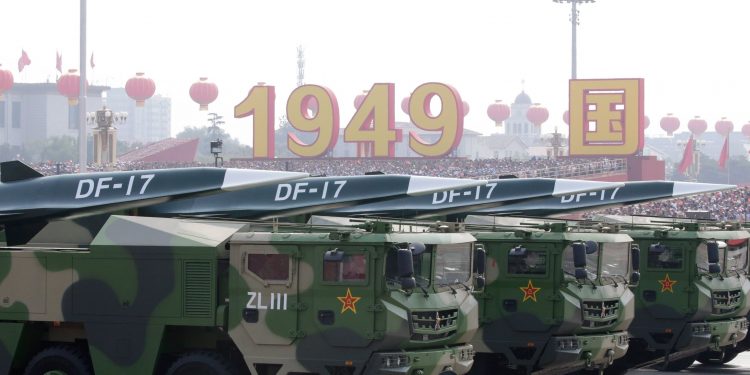China’s test of a globe-circling hypersonic weapon in July included the unprecedented launch of a separate missile from the ultra-high-speed vehicle, according to the Financial Times and Wall Street Journal.
The test showed China’s development of its strategic, nuclear-capable weapons as more advanced than any had thought, surprising Pentagon officials, the two newspapers said.
Neither the United States nor Russia has demonstrated the same ability, which requires launching a missile from a parent vehicle traveling five times the speed of sound.
The Financial Times, which first reported the test over the weekend, said US military experts are trying to understand how China mastered the technology, which puts them in advance of rivals in the hypersonic arms race.
The Wall Street Journal confirmed the report Monday.
The July 27 Chinese hypersonic test alone had already stunned Western officials.
In it, a launch vehicle, a long-range missile, carried the guided hypersonic warhead around the world and then released it toward a test target inside China.
The hypersonic, which unlike ballistic missiles can be steered, missed the target by more than 20 miles (32 kilometers), which the number two general in the Pentagon, General John Hyten, said last week was “close enough” for an initial test.
But more surprising was that the hypersonic, while flying from the south toward China, released a separate missile which rocketed away, falling harmlessly into the South China Sea.
That test stunned because the release took place while the vehicle was soaring at hypersonic speeds, above 3,835 miles per hour (6,175 kilometers per hour).
The Financial Times said Pentagon technology experts are unsure how the Chinese managed to pull the feat off.
The potential role of the released missile was unclear. It could be used to target or deflect an enemy country’s defenses against a hypersonic attack.
Whatever the use, it underscored the speed by which China has mounted a strategic challenge to the US military.
The Pentagon says China has also accelerated the production of nuclear warheads, which could be carried by a hypersonic missile as well as conventional submarine and land-based ballistic missiles.
Hyten told CBS News last week that the July hypersonic test, and a second one three weeks later, “should create a sense of urgency” in the United States.











